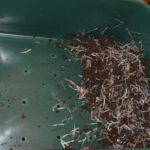12 November 2020 Media Release: Awareness about the dangers of illegal dumping continues
Media Release: Awareness about the dangers of illegal dumping continues
For Immediate Release
12 November 2020
Garden Route District Municipality (GRDM) and George Municipality recently started weekly clean-up activities in the illegal dumping and Covid-19 hotspots in Thembalethu and Pacaltsdorp areas in George. A Memorandum of Agreement (MOA) has already been signed to cement both institution’s agreement to achieve a certain set of goals over a 4-month period with the option of extending clean-up it. The MoA, provides specifics in terms of how the project will continue and how funding of R2.47 million injected into the project by GRDM will be utilised.

Expanded Public Works Programme (EPWP) workers and educators have been appointed to be the change-makers tasked to bring about a clean, green and a safe George. During their initial discussions, both municipalities identified the need for educators to interact and share valuable information with communities about illegal dumping, refuse removal and communication about waste management. Thirty six (36) educators are already doing door-to-door education and awareness as well as a survey to determine the causal factors of illegal dumping; and the community requirements; or possible solutions to prevent issues in future. Twenty four (24) educators have been assigned to Thembalethu and 12 to Pacaltsdorp. Each person, who moves in a group of six (6), is easily identifiable by a high visibility vest.
Educators received training on 10 November and the eager group commenced work on 11 November. The educators use masks and hand sanitisers in order to ensure that all health protocols are adhered to during their daily walkabouts, which is expected to continue for a 4-month period.
Executive Mayor for GRDM, Alderman Memory Booysen and the Portfolio Chairperson for Community Services at GRDM, Cllr Khayalethu Lose, and other leaders decided that the regional waste management office needs a joint approach to confront the illegal dumping phenomena. “We can only solve illegal dumping if municipalities get the buy-in from the public and their support for the project,” said Alderman Booysen. He further stated that, “GRDM and all the local municipalities wishes to remind the public that illegal dumping is a crime – we cannot let this continue and ruin our beautiful Garden Route. What about our future, that of our kids and our environment?”
The waste management unit, communicators and environmental health practitioners from GRDM work closely with George Municipality and have weekly planning sessions to address challenges. Morton Hubbe, GRDM Manager: Waste Management, said: “By having educators on a grassroots level we hope to gain a better understanding about public perceptions relating to waste management, current service delivery gaps and general issues in some wards”.
GRDM wishes to remind the public that illegal dumping of waste is dangerous and a health hazard. Waste should be collected in refuse bags and placed for collection on waste removal days. The communities are also urged to participate in the survey in order for municipalities to determine what needs to be done to assist the communities to prevent illegal dumping.
ENDS
Caption for feature image: Two of the 36 educators raising awareness about illegal dumping and conducting surveys in Pacaltsdorp.


























